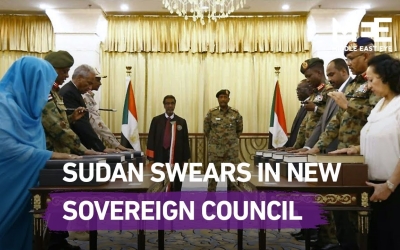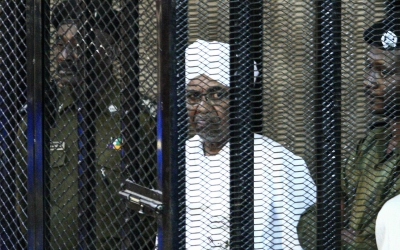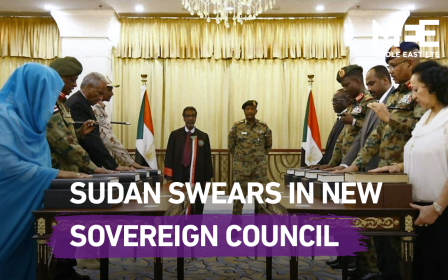Sudan: ICC 'seeks to have Bashir handed over' as Khartoum trial opens old wounds

The appearance of ousted Sudanese president Omar al-Bashir in court for the first time last month has encouraged the International Criminal Court (ICC), as well as many Sudanese, to bring their own cases against the former leader, sources have told Middle East Eye.
MEE understands that the ICC is among several international institutions seeking justice for alleged crimes committed during Bashir's 30-year rule, with sources saying that the intergovernmental organisation is preparing to submit an official request to urge Sudan's new transitional government to hand over Bashir to the Hague-based court for alleged crimes in the Darfur region.
Bashir is wanted by the ICC after it issued an arrest warrant against him in 2009 for war crimes and crimes against humanity, including murder, extermination, rape and torture. In 2010, pre-trial judges issued a new warrant with additional charges, including genocide.
Sudan's former president was formally charged on Saturday with illicit possession of foreign currency and corruption, after being charged in May with incitement and involvement in the killing of protesters during the demonstrations that led to his overthrow in April.
However, others affected argue that the current trial is merely a cosmetic exercise that seeks to brush over many of Bashir's alleged crimes.
New MEE newsletter: Jerusalem Dispatch
Sign up to get the latest insights and analysis on Israel-Palestine, alongside Turkey Unpacked and other MEE newsletters
Lawyers and activists are preparing to lodge more serious charges, including the toppling of the democratically elected government in 1989, much larger cases of corruption, and the deaths of protesters on earlier occasions.
New ruling council
Sudan's new 11-member sovereign council, which was sworn in last month, is made up of military and civilian representatives.
The council will govern for the next three years and three months, ultimately paving the way for democratic elections.
Salih Mahmoud, a leading member of the Darfur Bar Association, told MEE that the ICC will ask the new cabinet to hand over Bashir to the court.
Mahmoud, a legal expert and award-winning human rights activist, said that the new ruling council faced a critical decision as it was part of its responsibility to impose justice and to cooperate with the international community and the institutions of international justice.
The Sudanese Military Council (TMC), which led the country from the ousting of Bashir in April until the formation of the new military-civilian sovereign council last month, repeatedly stressed it could not decide the fate of the president regarding the ICC arrest warrant against him.
The TMC generals argued that the possible handover of Bashir was something that should be determined after the end of a transitional period and the election of a new government after three years.
“We have credible information that the ICC judges will urge the new regime of Sudan to hand over Bashir as soon as possible because it's now a democratic government and supposed to be committed to international laws," said Mahmoud.
'Arrest warrants remain valid'
Fadi El Abdallah, an ICC spokesperson, told MEE that the arrest warrants against Bashir remained valid.
"The two arrest warrants delivered by the ICC judges for Mr al-Bashir remain valid," he said.
"The court has and will continue seeking the compliance of Sudan with its obligation under international law and in relation to the resolution 1539 of the United Nations Security Council."
'We believe that justice is the first step for the stability of Sudan'
- Sulema Ishag, activist
Abdallah also added that if the Sudanese government wanted Bashir to be tried in Sudan, it must demonstrate that a genuine national investigation and prosecution will be conducted, among other conditions.
Legal expert Mohamed Omer Shomena told MEE that the new council was aiming to hand over Bashir if asked by the ICC.
Shomena said that Bashir could be tried inside Sudan but that situation would require major reforms to the entire justice system following 30 years of corruption, interventions by the government, and the lack of any independence.
“I do believe that the Sudanese judges and courts are ethically and technically eligible to prosecute Bashir, but that also needs a huge reformation process to our judiciary system, as well as a lot of amendments and new laws to match the international laws and respect for human rights.
“The objective of judicial reform in Sudan is very important not only for Bashir’s trial but also for the entire transitional justice, accountability and good governance in Sudan in the coming period, and this is the only way to achieve the goals of the revolution."
Hundreds of cases
In the meantime, the Alliance of Sudanese Lawyers has vowed to collect and submit hundreds of cases against Bashir.
Those cases include alleged atrocities in war zones, the killing of protesters and other civilians, missing persons, and the thousands of people dismissed from their jobs for political reasons.
Wail Ali Saeed, a leading member of the Alliance of Sudanese Lawyers, told MEE that they had prepared dozens of cases against Bashir, especially from families of protesters killed during the September 2013 nationwide protests in which more than 170 people died, as well as the recent wave of protests from December 2018 to April 2019 that saw Bashir's overthrow.
"We have done a lot of work and we have a lot of work still to be done... We have divided ourselves into groups to reach any Sudanese, or their relatives, that faced any kind of violations during Bashir's era," he said.
"We have reached a lot of victims and families and we will continue gathering these cases as we will submit all of these cases to the court, especially after the appointment of the new independent general prosecutor and chief of justice in the country."
Sulema Ishag, a leading member of an initiative by activists to seek justice for Sudanese victims, told MEE that they were coordinating with independent lawyers to gather evidence over the different kinds of violations, especially against women, in order to submit legal cases against Bashir.
“We are a large number of activists who are worried about the achievement of justice for the victims in Sudan because we believe that justice is the first step for the stability of Sudan," said Ishag.
Gulf money trail
Activists and lawyers have also highlighted the disclosure during last month's case of the receipt of money personally by Bashir from Saudi Arabia.
Bashir admitted in court that he had received $25m from Saudi Crown Prince Mohammed bin Salman, sent in cash on a private jet.
The former president said he used the money for donations and not for his own benefit.
Dismissing Bashir's claims, Saeed said that the case showed how Bashir and his assistants dealt with public money.
An investigator had previously told the court that Bashir received a total of $90m in cash from Saudi royals.
Sudanese army and intelligence members who searched Bashir’s residence in April found around $7m of foreign currency.
Saeed said given the other figures involved, the $7m for which Bashir was being charged in the current case was insignificant.
“This court [case] is nothing actually... I do believe that the stealing of $7m is nothing and it's a shame on all of us if it's considered that this case is enough for the accountability of Bashir," he said.
"The involvement of the ousted president with the Gulf in their competition for access, and his attempt to play off the different sides to get money to overcome his economic crisis, has caused a lot of corruption and mismanagement of the money and we will pick up this point from this court [case]."
Middle East Eye delivers independent and unrivalled coverage and analysis of the Middle East, North Africa and beyond. To learn more about republishing this content and the associated fees, please fill out this form. More about MEE can be found here.






